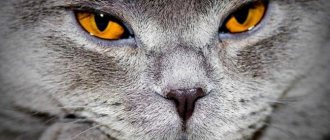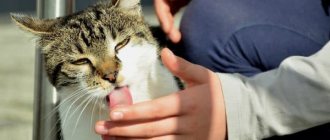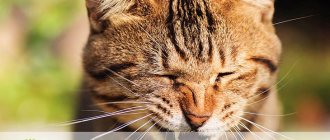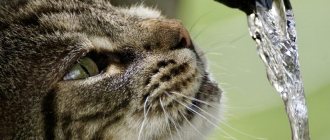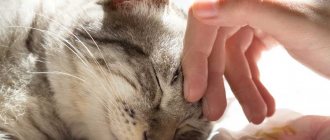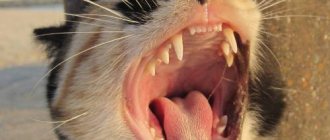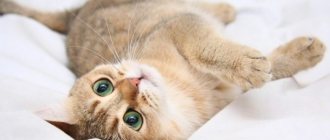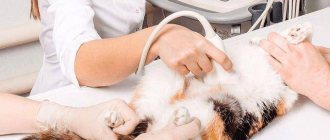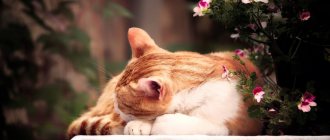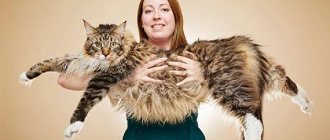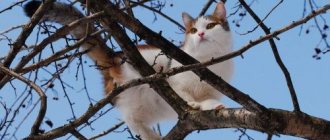As surprising as it may be, cats fart too. Of course, not as loud as people, and not as smelly as dogs. But they also suffer from flatulence.
Like many other animals, cats have gases in their digestive tract, and they leave the cat's body through the rectum every now and then.
Cats usually pass gas quietly and there is not much odor. However, cats can sometimes experience excessive bloating, discomfort, and foul-smelling gas. In this case, you and your cat need to contact a veterinarian to get to the bottom of the problem.
What Causes Gas in Cats and How to Treat It?
Causes of flatulence in cats
When “farting”, air and gases, which are formed under the influence of microorganisms, escape from the intestines through the animal’s anus.
The accumulation of large amounts of gases is accompanied by:
- rumbling in the intestines (sounds of peristalsis);
- manifestation of hiccups (when intestinal loops overcrowded with air irritate certain parts of the vagus nerve);
- exiting through the anus in small, imperceptible doses;
- explosive release of a large accumulation (what is called a “fart”).
Important! The release of gas from the intestines is completely normal. But. This process is the norm if others do not notice it. Up to 1000 cm3 of methane gas is formed in the intestines per day. It all comes out of the intestines in small parts and the owner’s nose cannot smell it.
The causes of gas formation may be:
- aerophagia. Along with the food, the animal swallows some of the air - this is the norm. Under the influence of various factors (stress, fear, rapid swallowing of food, eating large pieces), the cat swallows an excessive amount, and it accumulates in the intestinal tract. Excess air can be swallowed by an animal due to blockage of the nasal passages (rhinitis) as well as diseases of the oral cavity, teeth, esophagus, stomach;
- improper feeding diet;
- feeding with low-quality feed;
- feeding with food that causes fermentation processes in the intestines;
- infrequent feeding with a long time interval;
- allergic reactions to feeding certain types of food;
- pathologies of the gastrointestinal system of an inflammatory nature;
- oncological pathologies that cause blockages in certain areas of the intestine;
- the presence of sexually mature parasites in the intestinal lumen.
What is flatulence
Flatulence occurs when the intestines are distended due to distension with gases or air, which is swallowed along with food and water.
In this case, gases exit through the anus. Even healthy cats fart from time to time. This is a natural process of releasing accumulated gases. Normally this is at least 1.5 liters. Moreover, more than 90 percent is odorless methane. If an unpleasant “aroma” appears when farting, this indicates a disease or the cause is poor nutrition. The liver of animals is designed in such a way that it is not able to quickly process toxic substances. Therefore, pets should be given only certain food; “human” food can cause poisoning.
Some fruits, vegetables, and root vegetables cause gas accumulation. Therefore, they are excluded from the cat’s diet or given only in small quantities. Increased gas formation is also caused by overeating and unusual foods.
When eating delicacies, your pet's body needs time to produce the necessary enzymes to digest the new food. Gas formation occurs due to food allergies or intolerance to certain foods. Sometimes there is an aversion to only some components of dry food.
If the accumulated gases have nowhere to go, which happens with intestinal obstruction, then they collect in loops. The organ swells and the cat begins to feel pain. Flatulence can push stool back into the stomach or esophagus. Then the pet vomits feces. Any foods that cause gas formation can lead to intestinal obstruction.
Diseases accompanied by the release of gases
Excessive formation and release of gases usually occurs with pathologies in the gastrointestinal tract, both in the upper and lower sections. It could be:
- stomatitis (inflammation of the oral mucosa);
- gingivitis (gum inflammation);
- esophagitis (inflammation of the esophagus);
- gastritis (inflammation of the stomach);
- enteritis (inflammation of the small intestine);
- colitis (inflammation of the large intestine);
- diseases of a tumor nature in all parts of the gastrointestinal tract.
If we consider helminthic infestation, then flatulence is observed in diseases such as:
- opisthorchiasis;
- diphylobothriasis;
- toxocariasis;
- Dipylidiasis.
There are a number of infectious diseases of a bacterial and viral nature that cause pathology in the digestive system and flatulence as one of the symptoms. Such diseases include:
- salmonellosis;
- colibacillosis;
- viral enteritis.
It should be noted that flatulence does not necessarily accompany these diseases. They can manifest themselves without it, in fact, just like vice versa. To establish a diagnosis, a comprehensive clinical and laboratory examination of the animal is necessary.
Could cat fart be a sign of serious health problems?
If your cat experiences gas or the gas is caused by something she ate, there is nothing to worry about. The gas will flow on its own.
However, sometimes gas in cats is a symptom of something more serious.
You should call your veterinarian if your cat has persistent symptoms such as vomiting, bloating, bloody stool, foul-smelling gas, or if it refuses to eat or drink.
Some serious gastrointestinal problems in cats include:
- Inflammatory bowel disease
- Ulcers
- Gastrointestinal obstruction
- Worms or other intestinal parasites
- Cancer
Your veterinarian will examine your cat and ask about its diet and health history. They may ask for a stool sample or order blood tests or x-rays to find out what is causing your cat's gas and other symptoms.
Additional symptoms and what they mean
If flatulence is minor, then additional signs may be invisible or absent. But sometimes flatulence is accompanied by symptoms that can diagnose a serious illness.
Strong unpleasant odor
Normally, methane is produced in the intestines. When hydrogen sulfide and other components are added to this gas, the methane is diluted with aromatic compounds and the mixture acquires a stench.
Gas is formed as a product of the vital activity of microorganisms. If the “wrong microbe” multiplies in the intestines, then the processes become uncontrollable. A rapid increase in the number of opportunistic microorganisms or the entry and proliferation of pathogenic microorganisms leads to unpleasant odors.
Laboratory bacterial culture on nutrient media will help identify and eliminate microorganisms. It will also help you decide on the most sensitive antibiotics to microflora.
Diarrhea
Unformed fecal masses can occur with all of the diseases listed above. This sign is a protective reaction of the body. The intestines try to remove, get rid of microflora quickly, without absorbing water.
Thanks to this feature, the owner has the ability to quickly respond to problems in the animal’s body. Accumulated gases irritate the intestines, and fluid absorption processes are disrupted. Feces are not formed, but are excreted from the body in the form of chyme.
Vomit
If flatulence is accompanied by vomiting, then you should pay attention to helminthic infestation. It is especially dangerous in kittens.
If deworming is not carried out regularly and in a timely manner, then special attention should be paid to this additional symptom.
Doesn't go to the toilet
Alternating diarrhea and constipation or only constipation along with flatulence may indicate intestinal blockage.
The blockage can occur through sexually mature forms of helminthic infestation, as well as neoplasms.
Sometimes constipation can be caused by a fever. As the temperature rises, liquid is quickly absorbed from the intestines, and chyme moves more slowly than usual.
During pregnancy and after childbirth
Pregnancy of multiple animals, which includes cats, can provoke flatulence, especially in the second half. If there are a lot of fruits and they are no longer small, then the physical effects on the intestinal loops are quite normal.
After childbirth, when the birth canal is restored, the abdominal and pelvic organs return to their topographic boundaries, mild flatulence is also considered normal.
Foods that cause flatulence
Many cats have a hereditary fiber intolerance. Therefore, it is not recommended to give them bread and cereals. They cause fermentation, and as a result - an increase in the concentration of gases. In 90 percent of cases, this is the result of poor nutrition. The main risk group includes products that are given to all pets:
- Milk. This is my favorite dish. However, sometimes pets are lactose intolerant. Animals' ancestors received milk only after birth. As they grew older, this product was completely excluded from their lives. They switched to meat and water. Many pets have retained “genetic memory” and the body does not accept milk as a suitable food. This leads to indigestion, resulting in fermentation and accumulation of gases. The same process is typical for fermented milk products.
- Fish. It is considered “cat” food, but can cause flatulence. Basically we are talking about ocean fish, which are unusual for pets. Tuna, herring, sprat, and goby can be given only in small quantities. If you feed fish (especially ocean fish) every day, this will lead to flatulence and an excess of phosphorus. Farting with an unpleasant odor also occurs after an animal eats a canned product.
- Raw eggs. Many owners give their pet one per day. Eggs are indeed very healthy, but they can also cause problems with the intestines, hair, skin, and increase gas formation. Therefore, it is not recommended to feed this treat more than twice a week.
Uncharacteristic food for cats that causes flatulence
| The product's name | Brief description of the problem |
| Cereal | Often, owners begin to feed their pet semolina, corn, barley, and wheat porridge. This is already a guarantee of gas formation. Cats are meat-eating animals, and their bodies have difficulty digesting grains. As a result, intestinal irritation, fermentation processes, and gas accumulation begin. If you give porridge, then only rice and buckwheat. |
| Bread | It, like cereals, is not recommended for cats. In addition, bread may contain yeast, which further increases gas formation. |
| Garlic and onions | Many cat owners give them to their pets as an anthelmintic. However, the pet’s body is not adapted to consume such products. Onions and garlic can cause irritation, damage to the mucous membrane, problems with the gastrointestinal tract, and increased gas formation. |
| Fatty food | Cats should be given meat, not fat. It provokes indigestion and flatulence. For the same reason, smoked meats and spices are prohibited. |
| Cabbage | Some gourmet cats love to feast on cabbage. It always causes increased gas formation. You should not give any type of cabbage (broccoli, cauliflower, white cabbage). Also prohibited are other products - legumes, tea, coffee, which contain caffeine. They can cause serious illnesses, one of the symptoms of which is flatulence. |
| Alcoholic drinks | Some pets can happily lick beer, wine, and eat sauces based on them. This kind of food cannot be given. Licking a small amount once will not lead to trouble. Maximum - the pet will begin to fart loudly, getting rid of excessive accumulation of gases. Consumption of such products will often lead to more serious consequences, including death. |
| Chocolate, cocoa, hops | You can't give chocolate. It contains theobromine, which is very toxic to pets. Even a small amount of food eaten causes spatial disorientation, thirst, and increased gas production. For the same reason, cocoa and hops should not be given. |
| Tomatoes | Fresh tomatoes contain a poisonous alkaloid that can cause stomach and intestinal pain in animals. Violation of their work is accompanied by increased gas formation. |
| Avocado | Some cats are attracted to the smell and pulp of avocados. However, giving it to pets is strictly prohibited. Avocado contains persin. For cats, it is a dangerous toxin that can cause intestinal irritation, diarrhea, gas, and even death. |
| Raw root vegetables | Raw potatoes peeled for a pet are poison. The root vegetable disrupts the functioning of the intestines and genitourinary organs, and provokes gas formation. |
| Fruits | Seeds and seeds of apple, plum, nectarine, apricot or peach are strictly prohibited for cats - they can cause not only flatulence, but also cause swelling of the throat and lead to suffocation. |
Cats love to nibble on grass. It's useful for them. Animals find the plants they need on their own. However, rhubarb should not be given to your pet. The plant contains oxalates. If ingested by a cat, it causes food poisoning. As a result, not only flatulence may appear, but also disruption (or failure) of the kidneys. These consequences can be avoided by giving your cat boiled rhubarb. But then it becomes a natural laxative and can cause indigestion and excessive gas formation.
What foods cause flatulence?
It is not typical for a carnivore to consume feed with a high fiber content. It is better not to feed those foods that have a carminative effect to cats.
These include:
- pulses;
- cereals;
- granulated with cereals.
It is not difficult for an attentive owner to determine which food causes flatulence in his cat. Sometimes the most ordinary foods can be intolerable due to the lack of enzymes that break down certain ingredients in the body.
This often happens with dairy feeds. If there is no enzyme capable of breaking down lactose, then fresh milk can cause flatulence, although this is not a common occurrence for felines.
Sometimes among cats there are lovers, for example, of cucumbers. An interesting fact is that this vegetable does not cause flatulence in them. This once again speaks of the exceptional individuality of each organism.
Causes
At the most basic level, cats fart for the same reason as humans: gas builds up in their digestive tract.
For the most part, flatulence in cats is a completely natural occurrence, so if you only have to deal with the occasional fart, you probably don't have anything to worry about.
© shutterstock
On the other hand, excessive gas may be a sign that something is wrong with your cat's digestive tract. Here are a few things that could potentially cause the problem.
Swallowed air
What goes up must come down—or, in the case of gas, what goes in must come out. If your cat is swallowing food without chewing, there is a good chance that she is swallowing a lot of air along with the cat food.
Before this air can come out the other end, it must travel through your cat's intestines, picking up all sorts of odors along the way. You can buy special foods that will make your cat eat more slowly, which may be the best chance of solving this particular problem.
You can also feed your cat small meals more often, as this should limit the amount of air she takes in.
Poor quality food
Some low-quality foods contain ingredients that are difficult for cats to digest, such as fillers, animal byproducts, and high-carbohydrate foods. If your cat eats one of these foods, she will naturally fart in an attempt to absorb the nutrients.
If you suspect this may be the cause of your cat's foul odor, switch to a higher quality food. Cats are carnivores, so any food you choose should include high-quality lean meats such as chicken, turkey or fish.
You may also want to consider transitioning your cat to an all-natural raw diet.
Human food
We know it's hard for your cat to say no when she asks for a piece of what you're eating. However, most human foods contain chemicals and preservatives that cats simply cannot handle and can cause them to become very gassy.
If you must share what you eat with your cat, try to give her only lean meats. Cooked fish, chicken, turkey or steak can make great treats, but be careful how you season them because many spices can also cause intestinal distress in cats.
© shutterstock
Diet change
Unlike humans, cats are perfectly fine eating the same thing at every meal—in fact, they prefer it. If you suddenly change their diet, it can wreak havoc on their gut as they try to adjust.
If you need to change your cat's diet (for example, if you switch to a higher quality food), you need to do it slowly. Make the switch over a few weeks to allow your cat to get used to the new food without creating a stink bomb (i.e. farting).
Food allergies
Cats can have trouble processing certain foods, just like humans. If their food contains an ingredient they're allergic to, they'll let you know—one beep at a time.
Cats can be allergic to many foods, but the most common ones are beef, chicken, eggs, fish and dairy. However, these are common ingredients, so they are difficult to avoid.
If you think a food allergy may be the cause, you will have to follow an elimination diet to isolate the problematic ingredient. This involves feeding your cat only one food and then gradually adding more ingredients and monitoring her health.
Anal infection
Your cat's butt can be the source of a variety of conditions, from abscesses to anal gland disease. These problems are usually caused by your cat being unable to poop completely, resulting in clogged anal glands. Bacteria will accumulate inside, causing constipation, infection, and the cat will fart.
If the infection gets out of control, pus may begin to ooze from the anus. This is very painful for your cat and needs to be drained before it ruptures. (You'll probably want your veterinarian to handle the drainage.)
First, to avoid anal problems, make sure your cat gets plenty of fiber in her diet. This will help empty their anal sac completely, keeping everything clean and smelling good.
Diseases of the gastrointestinal tract
If something is wrong inside your cat, farting is one of the ways her body will let you know. Inflammatory bowel disease, respiratory disease, and exocrine pancreatic insufficiency are all possible causes.
These are all serious conditions that should be examined by a veterinarian as soon as possible.
Parasites
Some intestinal parasites can cause excessive gas. Hookworms, roundworms and coccidia are known to cause flatulence in cats, so you should try to eliminate them as a potential cause.
To diagnose any of these problems, you will need a veterinarian, and to do this, he will most likely need a stool sample. If caught early, these conditions can be treated fairly easily, but if you allow the problem to persist, it can be very detrimental to your kitten's health.
© shutterstock
Intestinal obstructions
If there is something in your cat's intestines that is blocking movement, gas will naturally build up behind it. Blockages are usually caused by your cat eating something she shouldn't, such as bones, string or toys, but they can also be caused by tumors, hernias and inflammation, among other things.
Obstructions can be fatal to your cat, so don't delay if you suspect your pet has one. Surgery will most likely be required to correct the problem.
Increased gas formation from dry food
When considering the described composition of ready-made dry food, cereal nutrients often come first. Considering the physiology of a cat, this is an undesirable component of food.
Statistics show that owners who organize feeding with dry food often turn to specialists for problems with flatulence. A natural diet or feeding canned food is more gentle on the cat’s digestive system, and flatulence occurs less frequently.
If the cat is on dry food, then the initial response to flatulence is to change the type of feeding. Translation should be carried out slowly, gradually, carefully.
What causes increased gas formation?
The following reasons will tell you why a cat farts and why the intestines do not function normally::
- Individual intolerance. Allergies are associated with a negative reaction of the body to certain foods. Most often these are gluten, milk sugar, and artificial ingredients in dry and liquid food. A striking example is budget food. Cheap formulations add elements that cause addiction in the animal, which then farts, suffers from gas and colic.
- Constipation. If a pet cannot empty its intestines or fart, this will inevitably lead to gas formation and other processes that cause discomfort to the cat.
- Limitation of intestinal functions. The pathology of the inability of the intestines to process food is most often a congenital problem. Other factors include injury or previous stomach illnesses. An accurate diagnosis can only be made with long-term observation by a doctor.
- Dysbacteriosis. For normal functioning, the stomach and intestines will need positive microorganisms. Their deficiency leads to decreased immunity and problems with flatulence, when the animal farts constantly. Bacteria are destroyed due to active use of antibiotics or through toxicity.
- Viral infection. If a cat goes outside and does this more than once a day, catching the virus is easier than ever. The most common is parvovirus, found in every second street reveler, for whom farting becomes the norm.
- Inflammatory process. Diarrhea, vomiting, and bad breath will help identify the presence of inflammation. Flatulence in such diseases is a side effect, signaling that it is time for your pet to see a veterinarian.
In addition to diseases, you should also know about the natural reasons why a cat farts a lot.
© shutterstock
Firstly , this is an increased amount of carbohydrates in the body. According to regulations, food for adults should not contain more than 15% carbohydrate particles. Moreover, it is better if these are so-called fast carbohydrates, the digestion and processing of which will not cause problems in the intestines and will not lead to farting.
Secondly , we must not forget about the rules for organizing a place for eating for a cat. When the bowl is too low or high, the cat is forced into an awkward position. This leads to air entering the stomach and natural gas formation, farting. If an animal farts and constantly faces such problems, there is a high risk of critical disruption of digestive processes.
Those who skimp on pet food face this problem more often. The cat farts very often, which is a consequence of exposure to artificial ingredients and flavoring additives that negatively affect the stomach, intestines and the body as a whole. Branded formulations are prepared from natural meat and include the entire vitamin complex aimed at strengthening the immune system.
According to doctors' studies, the main reason that a furry animal farts is swallowing air. Diseases and poor quality of feed take second place. But flatulence is always an individual indicator, although in a healthy cat gases pass out within two hours after eating and in most cases unnoticed by others.
A cat may also swallow air due to its own clumsiness. This is a common problem for kittens who want to eat constantly and try to empty the bowl as quickly as possible. Young cats fart more often. A plastic ball will help moderate the ardor. In this case, the kitten will have to select food and move the ball with its nose, which will significantly slow down its eating.
What to do and how to help your pet
If the flatulence is “mild”, then before the cause is determined and examined by a doctor, you can apply:
- Enterosgel - ½ teaspoon an hour before or an hour after feeding.
- Activated carbon - ¼ tablet 2 times a day.
The course of treatment lasts 5-6 days. If it is not possible to see a doctor, and in addition to flatulence there is a pain reaction, then you can ask:
- Baralgin;
- Spasmadol;
- Antipyrine.
Flatulence is not a disease, but only one of many symptoms. To establish a diagnosis and prescribe treatment, it is necessary to examine the animal.
Making the right diet for a cat
The best food for a cat is natural products of animal origin, which are closest to the food available to cats in nature.
The diet should include:
- meat and meat products (alternate types of meat: chicken, pork, veal, turkey, rabbit);
- offal (heart, lungs, kidneys, liver, poultry gizzards) and meat trimmings (beef tripe);
- fish and secondary raw materials of fish production;
- eggs;
- fermented milk natural products (fermented milk cheese, yogurt, whey, sour cream).
The listed foods should be in the animal’s bowl every day. Cats are not prone to overeating. However, if the diet is not balanced, then the animal greedily pounces on a certain type of food, this should be avoided.
If meat can be served raw to a cat, then fish and offal should be boiled for at least 20 minutes. This will prevent helminthic infestation and salmonellosis. If it is not possible to constantly feed the animal with natural food and dry food is inevitable, try combined feeding. In this case, you should carefully monitor the animal for some time for flatulence and, if it occurs, remove inappropriate food from the diet.
Prevention of flatulence
The prevention of flatulence will be rational and timely feeding of low-volume, easily digestible feed.
You should not allow greedy eating of food. The animal should not beg for food, it should be provided regularly. The food should be fresh, with a pleasant organoleptic feel, desirable for the animal. If feeding is carried out with canned food, you should carefully study the expiration dates and storage conditions. To avoid viral enteritis, animals should be vaccinated promptly and regularly.
To prevent helminthic infestation, you need to make it a rule to give complex anthelmintics quarterly. Particular attention is paid to the prevention of viral diseases and helminthic infestations if the cat has free range and contact with other animals.
